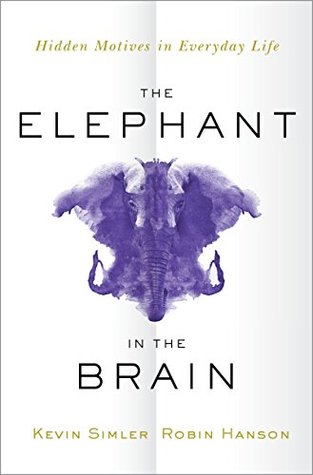More on this book
Community
Kindle Notes & Highlights
by
Kevin Simler
Read between
June 26 - July 14, 2018
Under the feel-good veneer of win-win cooperation—teaching kids, healing the sick, celebrating creativity—our institutions harbor giant, silent furnaces of intra-group competitive signaling, where trillions of dollars of wealth, resources, and human effort are being shoveled in and burned to ash every year, largely for the purpose of showing off.
Once our ancestors learned how to kill and punish each other collectively, nothing would be the same. Coalition size would balloon almost overnight. Politics would then become exponentially more complicated and require more intelligence to navigate, and brains would struggle to catch up for thousands of generations. And soon, norms would begin to proliferate, starting with the norm against being a too-dominant alpha, and continuing to this day as we invent new norms for every new context we develop (e.g., netiquette).
several people working for several months on a project to score prominent pundits on the accuracy of their predictions. The project was canceled, however, soon after results came back showing how depressingly inaccurate most pundits actually are. If consumers truly cared about pundit accuracy, there might well be more “exposés” like this—the better for us to find and pay attention to those rare pundits whose predictions tend to come true. Instead, we seem content with just the veneer of confidence and expertise, as long as our pundits are engaging, articulate, connected to us, and have
...more
when researchers Jesse Prinz and Angelika Seidel asked subjects to consider a hypothetical scenario in which the Mona Lisa burned to a crisp, 80 percent of them said they’d prefer to see the ashes of the original rather than an indistinguishable replica.31 This should give us pause.
The logic of conspicuous caring is especially clear in what happened to England’s King Charles II, who fell inexplicably ill on February 2, 1685. The records of the king’s treatment were released by his physicians, who wanted to convince the public that they had done everything in their power to save the king. And what, exactly, did this entail? After a pint and a half of blood was drawn, according to Belofsky, His Royal Majesty was forced to swallow antimony, a toxic metal. He vomited and was given a series of enemas. His hair was shaved off, and he had blistering agents applied to the scalp,
...more
This highlight has been truncated due to consecutive passage length restrictions.
A 2012 Gallup poll, for instance, found that atheists came in dead last in electability, well behind other marginalized groups like Hispanics and gay people.40 In fact, Americans would sooner see a Muslim than an atheist in the Oval Office.41 An atheist kneels before no one, and for many voters, this is a frightening proposition.
The fact that we attach strong emotions to our political beliefs is another clue that we’re being less than fully honest intellectually.
The answer we’ve given in this chapter is that we use far-off national politics as a medium in which to jockey for local advantages. As apparatchiks, we’re motivated less by civic virtue than by the desire to appear loyal to our political coalitions. And if politics is a performance, then our audience is mostly our peers—friends and family, coworkers and bosses, churchmates and potential romantic partners, and anyone who might follow us on social media.


